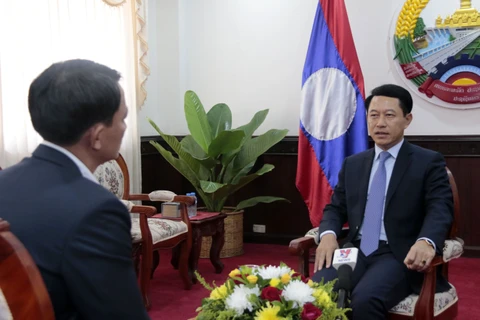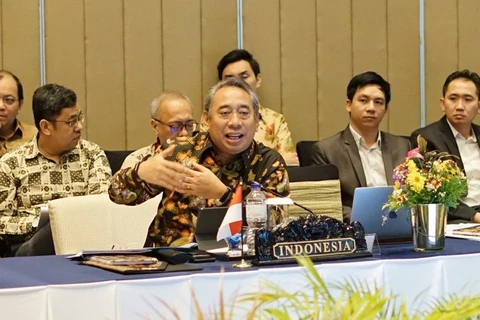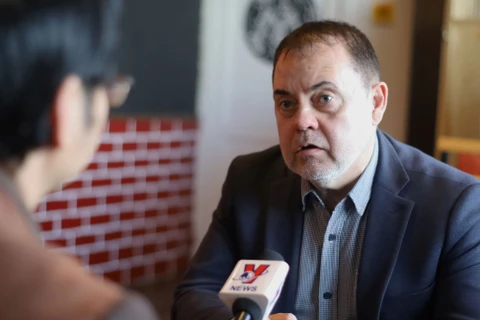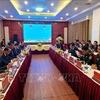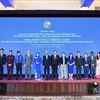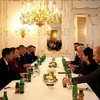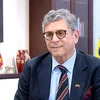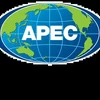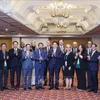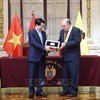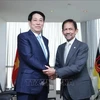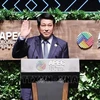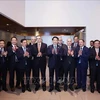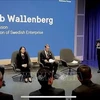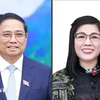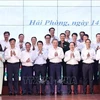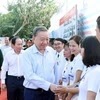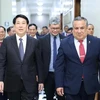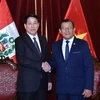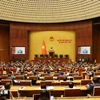Hanoi (VNA) – Becoming a member of the Association of Southeast Asian Nations (ASEAN) has brought about great benefits to Vietnam in various fields, according to Deputy Foreign Minister Nguyen Quoc Dung.
Dung, who is head of Vietnam’s SOM ASEAN, granted an interview to the media on the occasion of the 25-year ASEAN membership of Vietnam and important benefits that Vietnam has enjoyed from the ASEAN Community.
First of all, the ASEAN membership makes it possible for Vietnam to boost fast and sustainable growth thanks to a peaceful and stable environment for development, while helping Vietnam expand partnerships with more countries and territories in the word, widening the market and attracting more resources, he said.
Secondly, Vietnam has been supported to enhance its capacity to better integrate into the bloc and the world, as well as boost its reform and institution perfection towards the regional and international standards.
Thirdly, becoming an ASEAN member has increased the position and role that Vietnam plays in the international arena, while helping the country become more confident to join international playgrounds, he said.
Vietnam has become an active member of not only ASEAN but also the international community, he said, adding that from mere participation, Vietnam has been strong and confident enough to engage in international integration, making practical contributions to common work of the globe.
The Deputy FM said that the past 25 years witnessed great changes of ASEAN and Vietnam. The association has become a successful, dynamic and creative organisation and the fifth largest economy of the world.
Meanwhile, Vietnam, from a backward and subsidy economy has turned into a middle-income country with dynamic market economy and active regional and international integration.
<div class="flourish-embed flourish-bar-chart-race" data-src="visualisation/3262004" data-url="https://flo.uri.sh/visualisation/3262004/embed"><script src="https://public.flourish.studio/resources/embed.js"></script></div>
Vietnam has been an active and responsible member of ASEAN with close coordination with other members to deal with emerging challenges as well as strategic issues related to peace, development and prosperity of the grouping, thus enhancing the position of both the association and Vietnam in the region and the world.
Regarding major contributions that Vietnam has made to the bloc, Dung said that Vietnam, ranking third in population and fourth in area in the Southeast Asian region, has helped ASEAN become stronger in resources, scale and organisation, contributing to putting an end to skeptics and conflicts, and opening a new development era of peace, stability, cooperation and development.
Moreover, Vietnam has actively engaged in and contributed to the building of growth orientation and major decisions of the ASEAN, including the ASEAN Charter, the ASEAN Community 2025 Vision and Master Plans, as well as the ASEAN Master Plan on Connectivity, and Initiative of ASEAN Integration, stated the Deputy FM.
He held that Vietnam has also made active and responsible engagement in the implementation of joint decisions of ASEAN.
Vietnam has fully and intensively rolled out cooperation activities in politics-security, culture-society and economy, while chairing many events.
Vietnam is among countries with a high ratio of realising economic connection programmes and measures, noted the diplomat.
He said that after only three years of joining the association, Vietnam successfully organized the sixth ASEAN Summit in Hanoi in 1998 and showed good performance as ASEAN Chair in 2010.
Besides, the country has also contributed to shaping, reinforcing and developing ASEAN-formed and -led institutions, including the East Asia Summit (EAS) and the ASEAN Defence Ministers’ Meeting Plus. Vietnam also campaigned to become a representative of ASEAN at the G-20 Summits in the Republic of Korea and Canada.
Deputy FM Dung asserted that factors that lead to ASEAN’s success include consensus among members without interfering in each other’s internal affairs, along with mutual respect, and firm steps suitable to the capacity, ensuring the equality in both interest and obligation, and making sure that all members feel their voice in the decision-making process with no one left behind.
He highlighted the geo-strategic location of ASEAN at the centre of a massive region connecting the Indian Ocean and the Pacific, which gives the grouping an important position in international relations in close connection with interests of many world powers.
With a population of over 650 million, ASEAN is a potential market and a bright spot in the world economic picture, he said, adding that in 2050, the association is forecast to become the fourth largest economy in the world.
The third factor for the association’s success is its aspirations and efforts to build a neutral and peaceful region where all countries with different political systems, development levels, cultures and religions can cooperate with each other, ensuring security, stability and maintenance of economic growth, said Dung.
He also underscored the significance of the grouping’s success in building mechanisms and playgrounds that draw active engagement of countries, especially major ones, thus forming and sharing the regional architecture. More and more outside partners have shown their hope to establish partnership with ASEAN and join the Treaty of Amity and Cooperation (TAC), he added.
Mentioning the orientations for ASEAN development until 2025 and beyond, Deputy FM Dung said that amidst rapid, complex and unpredicted changes of the region and the world, ASEAN must be succeed in building a cohesive, self-resilient and strong community.
To this end, the grouping should enhance intra-bloc connections through common interests, renovation and reinforcement of current cooperation foundations and institutions.
ASEAN should reinforce and promote its central role in the region. An association with solidarity and unity is a key factor helping it maintain the role as well as balance its relationship with partners, said Dung.
He stressed that ASEAN’s development orientations are suitable to Vietnam’s policy. ASEAN is always among top priorities in Vietnam’s external policy, he stated, adding that Vietnam will enjoy benefits from the grouping and continue to give initiatives and orientations to contribute to the community building at the same time.
A strong and self-resilient ASEAN Community will be a firm back for Vietnam to overcome difficulties in the future, he concluded./.
Vietnam has been an active and responsible member of ASEAN with close coordination with other members to deal with emerging challenges as well as strategic issues related to peace, development and prosperity of the grouping, thus enhancing the position of both the association and Vietnam in the region and the world.
Regarding major contributions that Vietnam has made to the bloc, Dung said that Vietnam, ranking third in population and fourth in area in the Southeast Asian region, has helped ASEAN become stronger in resources, scale and organisation, contributing to putting an end to skeptics and conflicts, and opening a new development era of peace, stability, cooperation and development.
Moreover, Vietnam has actively engaged in and contributed to the building of growth orientation and major decisions of the ASEAN, including the ASEAN Charter, the ASEAN Community 2025 Vision and Master Plans, as well as the ASEAN Master Plan on Connectivity, and Initiative of ASEAN Integration, stated the Deputy FM.
He held that Vietnam has also made active and responsible engagement in the implementation of joint decisions of ASEAN.
Vietnam has fully and intensively rolled out cooperation activities in politics-security, culture-society and economy, while chairing many events.
Vietnam is among countries with a high ratio of realising economic connection programmes and measures, noted the diplomat.
He said that after only three years of joining the association, Vietnam successfully organized the sixth ASEAN Summit in Hanoi in 1998 and showed good performance as ASEAN Chair in 2010.
Besides, the country has also contributed to shaping, reinforcing and developing ASEAN-formed and -led institutions, including the East Asia Summit (EAS) and the ASEAN Defence Ministers’ Meeting Plus. Vietnam also campaigned to become a representative of ASEAN at the G-20 Summits in the Republic of Korea and Canada.
Deputy FM Dung asserted that factors that lead to ASEAN’s success include consensus among members without interfering in each other’s internal affairs, along with mutual respect, and firm steps suitable to the capacity, ensuring the equality in both interest and obligation, and making sure that all members feel their voice in the decision-making process with no one left behind.
He highlighted the geo-strategic location of ASEAN at the centre of a massive region connecting the Indian Ocean and the Pacific, which gives the grouping an important position in international relations in close connection with interests of many world powers.
With a population of over 650 million, ASEAN is a potential market and a bright spot in the world economic picture, he said, adding that in 2050, the association is forecast to become the fourth largest economy in the world.
The third factor for the association’s success is its aspirations and efforts to build a neutral and peaceful region where all countries with different political systems, development levels, cultures and religions can cooperate with each other, ensuring security, stability and maintenance of economic growth, said Dung.
He also underscored the significance of the grouping’s success in building mechanisms and playgrounds that draw active engagement of countries, especially major ones, thus forming and sharing the regional architecture. More and more outside partners have shown their hope to establish partnership with ASEAN and join the Treaty of Amity and Cooperation (TAC), he added.
Mentioning the orientations for ASEAN development until 2025 and beyond, Deputy FM Dung said that amidst rapid, complex and unpredicted changes of the region and the world, ASEAN must be succeed in building a cohesive, self-resilient and strong community.
To this end, the grouping should enhance intra-bloc connections through common interests, renovation and reinforcement of current cooperation foundations and institutions.
ASEAN should reinforce and promote its central role in the region. An association with solidarity and unity is a key factor helping it maintain the role as well as balance its relationship with partners, said Dung.
He stressed that ASEAN’s development orientations are suitable to Vietnam’s policy. ASEAN is always among top priorities in Vietnam’s external policy, he stated, adding that Vietnam will enjoy benefits from the grouping and continue to give initiatives and orientations to contribute to the community building at the same time.
A strong and self-resilient ASEAN Community will be a firm back for Vietnam to overcome difficulties in the future, he concluded./.
VNA


